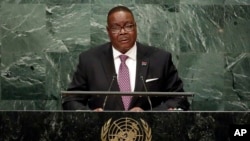Malawi’s government has announced that President Arthur Peter Mutharika will return to the country Sunday – weeks after attending the U.N. General Assembly meeting of heads of state and government in New York last month.
A cross-section of Malawians have demanded information regarding the whereabouts of the president after the meeting. This, after expressing concern the administration in Lilongwe has refused to inform the public about the whereabouts of the president. They contend that all the world leaders who participated in the U.N. meeting have returned to their respective countries and wonder why Mutharika has yet to do so.
Khumbo Soko, the general-secretary of the Malawi Law Society, says public demands for information about the president’s whereabouts are legitimate.
“Everyone is waiting with bated breath (great anticipation) for the president to touch down and possibly explain to Malawians where he was and more importantly why the statehouse didn’t find it important to tell Malawians where the president was after his engagement at the U.N. General Assembly. As you can imagine, it has given rise to quite some very unhappy speculation and I think all these were needless if people have just been told where the president was. There would have been no need for people to engage in speculation as it were,” Soko said.
“The way we see it is that it’s part of accountability. The starting point must be that if you exercise powers of state, you are doing so on behalf of people, the people are the ones that have put you in office. And therefore, they have a legitimate interest in knowing where you are. After all, if indeed it was correct the president was in the U.S. on our behalf, that he was working after the U.N. General Assembly, it is actually the public that is footing this bill, and in that respect, it was only going to be fair for the people of Malawi to be told at least where the president was,” Soko added.
Deeper roots
Some political analysts say the lack of transparency about the president’s whereabouts could be traced back to the country’s founding president, Hastings Kamuzu Banda.
During Banda’s 33-year rule, they said, there was no information about his travel plans or when he would return home from his meetings abroad. Many speculated that it could have been his way of trying to prevent his administration from being overthrown during the latter part of his presidency.
During his presidency, Banda consolidated power and declared Malawi a one-party state under the ruling Malawi Congress Party (MCP). The MCP subsequently made him the party's President for Life. And in 1971 he did indeed became the country’s lifetime president.
“That is a fair assessment. We seem to be struggling to shake of the legacy of I think the 30 years of one-party rule when things were very secretive, when matters relating to the president were only known by a tiny circle of people,” Soko said.
“The constitutional order that we adopted in 1994, it does and demands more transparent government where this kind of thing should really be routine and not people struggling to get this kind of simple information. So, it’s quite legitimate that it’s a hangover from our troubled past.”
Soko, however, said calls for a possible constitutional amendment to demand more transparency are misplaced, since he says the current constitutional “provisions are expansive enough, they make it absolutely clear that those who govern do so on behalf of the people of Malawi. The obligations to be transparent and open and to account to the people of Malawi are clearly spelt in the constitution.”








